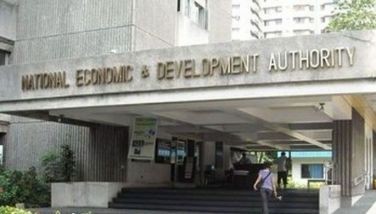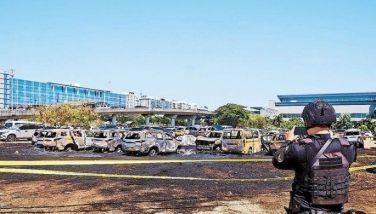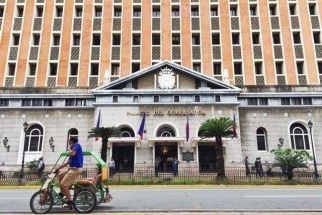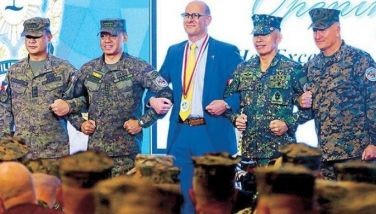Diokno to SC justices: Social media posts may be considered terrorism under anti-terror law
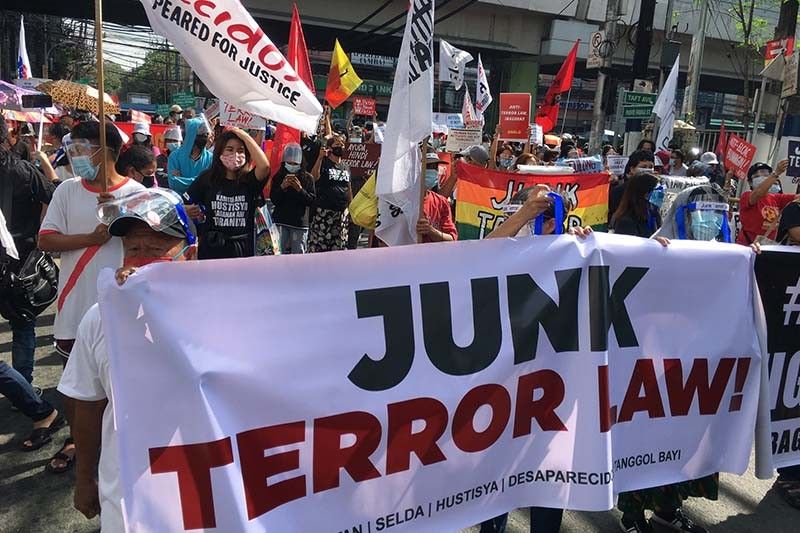
MANILA, Philippines — Even ordinary citizens who exercise their basic rights on social media platforms such as Facebook and Twitter may be put at risk because of the anti-terrorism law, a human rights lawyer said as he urged the Supreme Court to strike down the controversial law.
The Supreme Court held Tuesday oral arguments on the 37 petitions challenging Republic Act 11479 or the Anti-Terrorism Act of 2020.
Chel Diokno, one of the seven lawyers who presented the positions of the petitioners, said the measure gives law enforcers the power to arrest any citizen based on their subjective impression of his or her intent.
The law provides that terrorism does not include advocacy, protest, dissent, stoppage of work, industrial or mass action, and other similar exercises of civil and political rights. But it stressed these activities should not be intended to “cause death or serious physical harm to a person, to endanger a person’s life or to create a serious risk to public safety.”
“No other law makes the exercise of constitutional rights a crime when actuated by a certain intent. No other law empowers the State to arrest its people for exercising rights guaranteed by the Constitution based solely on a law enforcer’s subjective opinion of their state of mind,” Diokno said.
The chair of the Free Legal Assistance Group stressed that anyone who exercises basic rights may be found liable for terrorism crimes.
“Anyone, therefore, who tweets for people to attend a peaceful rally could be arrested for engaging in acts intended to endanger a person’s life due to the danger of [COVID-19] infection,” Diokno said.
“Anyone who posts on Facebook for the people to boycott a digital services company owned by someone close to the president or who engages in a transport strike, could be arrested for engaging in acts intended to cause extensive interference with critical infrastructure since the term includes ‘system[s] affecting telecommunications… and transportation,’” he added.
Cardinal Sin
Diokno stressed that if the law were applied in 1986, Archbishop Jaime Cardinal Sin’s call for people power would qualify as inciting to terrorism. The Catholic Church leader urged the public to go to Camp Crame and protect political leaders who had broken ties with late dictator Ferdinand Marcos Sr.
“By exhorting the people to gather at EDSA, Cardinal Sin incited them to engage in acts intended to cause extensive interference with critical infrastructure and to endanger people’s lives,” Diokno said.
“Cardinal Sin’s call would also qualify as seriously destabilizing the country’s fundamental political and creating a public emergency,” he added.
Diokno asked the tribunal to nullify the law “before it inflicts a mortal wound on the rights and freedoms that give life to our cherished democracy.”
Brandenburg v. Ohio
Associate Justice Rosmari Carandang, who was first to interpellate, asked Diokno whether a call of a social media influencer with one million followers on Twitter to topple the government by bombing Malacañang could qualify as inciting to terrorism.
Carandang asked this in line with the Branderburg test, which was established in the Branderburg v. Ohio, a landmark decision of the United States Supreme Court.
The test determined that the government may prohibit speech advocating the use of force or crime if it satisfies both elements of the two-part test which include: the speech is “directed to inciting or producing imminent lawless action” and the speech is “likely to incite or produce such action.”
“The problem with Section 9 (inciting to terrorism) is that it does not incorporate the requirements of Branderburg,” Diokno said.
“That is not found in the law… While there’s an attempt by the implementing rules to include that, that is an essential element that should only be made by Congress,” he added. — Gaea Katreena Cabico
President Rodrigo Duterte signed the Anti-Terrorism Law on July 3 despite opposition from rights groups and civil society groups that it could be used to stifle human rights.
A petition against the law has been filed at the Supreme Court and other groups are preparing pleadings of their own.
Follow this page for updates. Photo courtesy of The STAR/Michael Varcas
National Security Adviser Hermogenes Esperon moves to block access to several websites, including news sites of alternative news orrganizations Bulatlat.com and Pinoyweekly.org.
In his letter to the National Telecommunications Commission, he only says the websites are "affiliated to and are supporting these terrorists and terrorist organizations."
No other basis to back up his allegation was cited in the letter.
Citing the designation of the CPP-NPA-NDF as terrorists, NSA Hermogenes Esperon moves to block access to several sites.
— Kristine Patag (@kristinepatag) June 22, 2022
In Esperon's letter to the NTC, he included news sites @bulatlat and @pinoyweekly; sites of other progressive groups RMP and Save our Schools. @PhilstarNews pic.twitter.com/nAzMITJFsS
The Commission on Human Rights says it "partly welcomes" the Supreme Court decision that some parts of the controversial Anti-terrorism Law are unconstitutional.
CHR spokesperson Jacqueline de Guia says the commission remains hopeful that the remaining contentious provisions of the law will be clarified by the high cour in the full text of the decision.
"At the same time, our commitment remains in guarding against possible human rights violations arising from the implementation of the anti-terror law. We steadfastly remind the government that countering terrorism and protecting human rights are not competing values but are, in fact, mutual and complementary," De Guia says in a statement.
The Supreme Court has deliberated and voted on the controversial Anti-Terrorism Act but the decision will be released "at the soonest time possible."
"However, considering that there were numerous issues resolved in the case, as well as the fact that each Justice had to vote on each issue, there is a need to accurately confirm and tally the vote of each Justice in order to ensure the correct resolution of the Court per issue," SC spokesperson Brian Hosaka says.
The Anti-Terrorism Council designates the National Democratic Front of the Philippines, the panel that negotiates for communist rebels during peace talks a terrorist organization.
Previous designation of the Communist Party of the Philippines and New People's Army led to the designation of supposed members of the CPP's Central Committee. Among those designated as terorrists were peace consultants.
Designation gives the Anti-Terrorism Council the authority to investigate and freeze the accounts of designated persons.
The Anti-Terrorism Council has designated 29 people, including alleged members of the Communist Party of the Philippines-New People's Army, as terrorists in two resolutions.
Designation allows the Anti-Money Laundering Council to freeze the assets of those on the list.
- Latest
- Trending

















